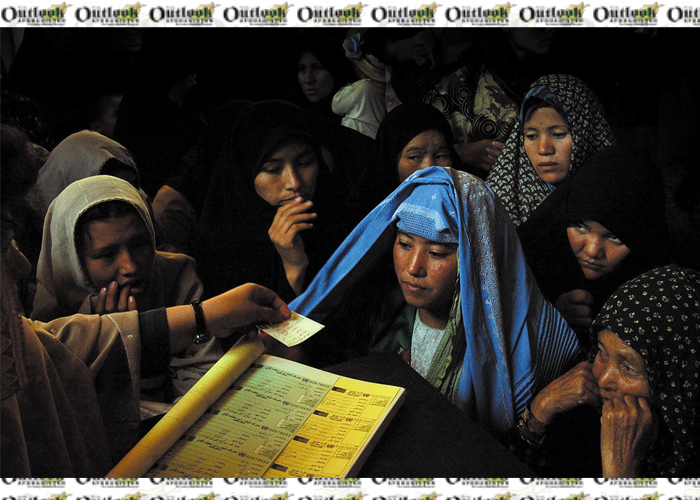On the eve of new century, it is good to evaluate the present concerns and condition of women with light of past experience. Unfortunately, the political culture of Afghanistan had largely deprived women from very basic rights and freedoms before the reign of Amanullah Khan. Although women comprise half of Afghanistan’s population, they had been deprived from very basic rights and freedoms before his kingdom. It was nearly one century ago when the Modernist king of Afghanistan, Amanullah Khan, provided a new interpretation and views from women rights in the country, in 1919. In fact, he began many reforms in social and political institutions to modernize the country. In his reign, men and women got equal rights and educational opportunities. Women for the first time in Afghanistan could walk at the same level with men.
Thus, Women started to have an active part in socio- economic activities. Women got a glimpse to move forward so as to prove themselves as autonomous human beings with dignity.
They for the first time got the chance to put aside the taboos and break through traditional superstitions as well as go beyond social and religious coercive limitations. In fact, a new horizon of the perspectives appeared for them to seek the life each human deserves.
But of course it was not the end; as now, the tribal customs was a great sway on the way.
There were two paths were being shaped, the first which led to equal rights between men and women according to law and the second was traditionalist which claimed “women should act according to traditional norms”. The situation went this way throughout the reigns of the successor kings till 1964.
In 1964, during last king of Afghanistan Mohammad Zaher, woman, once again, was given equal civil and political rights by constitution. In the constitution which was rectified during the last king became the base for the women’s liberty in the country.
Women got the right to education. Schools were no longer only for boys, girls could also participate in the classes. The woman could have been as a teacher, a doctor, a judge, a university lecturer even an author. Theaters were open; men and women could be a part of the cinema industry regardless of their sex.
As an example: Hungama, Mahwash and Parween are the known female singers of the time. The constitution guaranteed Freedom of media and freedom of speech.
In 1973, Mohammad Daud overthrew king Zaher and established the republic of Afghanistan. At this time president Daud had warm relations with Soviet Union. Communism was in the apex of power since Soviet Union and the allies had won the victory in Second World War. For this reason, the Afghan communist party got the government after president Daud. In fact, the communist period in Afghanistan had been the age of democracy and equal opportunities for all. At the beginning of 1990s Mujahidin began a war against Soviet Union and made them to withdraw all their forces from Afghanistan. Finally they succeeded and Soviet Union left Afghanistan. With the end of communist era in Afghanistan the ethnic war began and Afghans went through very bloody and hard years. It was the worst when it came to women’s’ conditions.
In 1995, when the Taliban invaded Afghanistan and took over the power, the age of Fundamentalism began; Freedom of media and freedom of speech faded out. The first and most important right that women lost was the right to learn. Schools came to be merely for boys. No woman could step out except she was fully covered in Hijab. They were not allowed to work. They were only like dolls behind walls. It was the worst for women that Taliban laws provide men with the chance to abuse women. In a metaphor one can say “they were only cards in the hands of male players” or they were the walking chocolates which could come out of the cover only when men allowed them.
In a sense women were aliens and refugees of the time as no one let them educate and seek the ideal life. No constitution existed to give women the fundamental rights, the right to liberty, equality and pursuit of happiness.
In short, the socio-political functions of women had been cut to zero from 1996 – 2001, during the Taliban regime.
In 2001, once again women revived its dignity and freedom in Afghanistan.
The age of fundamentalism ended with end of Taliban regime and presence of international community. Karzai became the transitional president as well as the cabinet ministers were introduced, there were several women among them. In fact, women and men got to enjoy the same rights in accordance with the new constitution approved in 2004. Now, a large number of women are able to enjoy hard-won freedoms after one century ups and downs, but they fear these will be lost if the Taliban return to power unconditionally.
There is wide consensus that the mentality of the Taliban has not changed towards women as they have killed many women and ignited tense of girls’ schools in last two decades.
Therefore, the rights and freedoms of women must be forgotten in the peace process. We must note that the issues of women’s rights and minorities have been of very important and sensitivity issue in the country; therefore, the expectation of Afghan minority groups and women community from the United States and the international community is to protect women’s rights and minority groups rights in the peace process with Taliban. Otherwise, no lasting peace would be built on deprivation and victimization of more than half of population in the country.
Home » Opinion » The Status of Afghan Women in One Last Century
The Status of Afghan Women in One Last Century
| Mohammad Zahir Akbari

